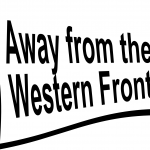The Greater Zab River near Erbil, Iraqi Kurdistan (Source: Wikipedia)
This website seeks to highlight many of the campaigns which took place away from France and Flanders and to share details of some of the men and women who served there, often many thousands of miles away from home.
‘Away from the Western Front’ began life in 2017 as a First World War centenary project funded by the Heritage Lottery Fund, with additional grants from the British Institute for the Study of Iraq (Gertrude Bell Memorial) and the Centre for Hidden Histories. The project was managed by the charity, ‘Away from the Western Front’, which was a registered Charitable Incorporated Organisation (number 1167582) established in June 2016 and dissolved in July 2019. It was governed by a Board of Trustees (David Crampin CBE, Lyn Edmonds, Alan Wakefield and Steve Warburton), and it did not employ any staff. As a project it comprised regional and national activities, which were delivered by staff or freelancers at various partner organisations. National activities were carried out by the National Coordinator and a comprehensive evaluation report was produced. The project’s activities can be found in the Archive.
Why ‘Away from the Western Front’?
The Western Front has remained the main focus for European commemorations of the First World War but the campaigns which took place away from the Western Front allow us to place the war in a global context, in which several empires grappled for world power and influence, leading to a major reorganisation of the international political situation in the years following the war. Britain’s part in this, its attempts to safeguard its place on the world stage and the consequences of this are as important as any European outcomes. A central aim of ‘Away from the Western Front’ is to understand what made the conflict a World War.
Why is it still important today?
Most of the campaigns featured in the original project took place in areas which are now beset with political, religious and social unrest. The roots of many of the problems in the Middle East can be traced back to the First World War: the struggle for control of the Mesopotamian oil fields; the establishment of the state of Israel in Palestine; the rise of Muslim fundamentalism in areas formerly overseen by an Ottoman Caliph within a tolerant Ottoman secular state; the arbitrary redrawing of borders on political, not social and ethnic lines, leading to displacement and repression. The recent increase in the number of refugees and asylum seekers fleeing to Europe puts this into a highly relevant contemporary perspective.
Which campaigns took place away from the Western Front?
The First World War covered the globe including naval and air actions. The main campaigns involving British troops who left Britain to serve far from home included:
- The Balkan Front, including Gallipoli and Salonika
- The campaigns in Egypt, Palestine and Syria
- The Mesopotamian campaign, including Iran
- The East African campaign
- The Italian campaign
Contact Us
We welcome enquiries about any of the campaigns which took place away from the Western Front, or the creative activities linked to the original project. We have good links with experts in local, national and international history so if we cannot answer you ourselves, we can probably put you in touch with someone who can.
If you would like to see your ancestor’s story appear in our Soldiers’ Stories or Women AFTWF sections, please contact us to discuss.
Please email us at: info@awayfromthewesternfront.org
Additional information
As a project, ‘Away from the Western Front’ was fortunate to have had support from an expert panel of leading military historians. They were:
- Alan Wakefield, Head of First World War and Early 20th Century Conflict at the Imperial War Museum, author of Under the Devil’s Eye: the British Military Experience in Macedonia 1915-18 (Pen & Sword Military, 2011) and Wakefield, A., Moody, S., From Basra To Baghdad: The British Campaign In Mesopotamia 1914-18 (Sutton Publishing, 2008)
- Professor Eugene Rogan, Director of the Middle East Centre at St Antony’s College, University of Oxford and author of The Fall of the Ottomans: The Great War in the Middle East, 1914-1920 (Penguin, 2016)
- Burçin Çakır, Turkish military historian based in the UK, with a particular expertise in the Ottomans in the First World War
- Major Paul Knight, PhD, VR, military historian and serving army officer, author of The British Army in Mesopotamia, 1914-1918 (McFarland & Co., 2012)
- Taff Gillingham, film-maker and military adviser for drama, film and TV, including Private Peaceful, Downton Abbey and All the King’s Men
- Dr. Anne Samson, coordinator of the Great War in Africa Association
- Gareth Davies, M.A., who spent 28 years in the regular army, including postings in the Balkans and Middle East, and is now an army reservist, battlefield guide and expert on the First World War, in particular the Palestine Campaign
- Stuart Hadaway, military historian and former curator of the Air Force Museum, author of Pyramids and Fleshpots: The Egyptian, Senussi and Eastern Mediterranean Campaigns, 1914-16 (Spellmount Publishers Ltd., 2014)
For more information or to contribute, email info@awayfromthewesternfront.org

